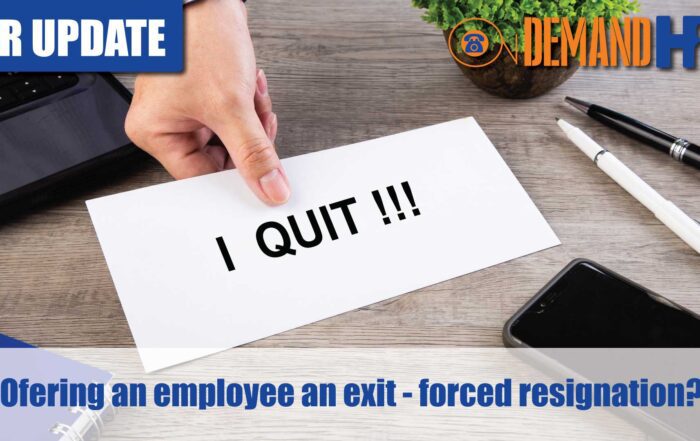Already had your Employment Contracts reviewed by a lawyer? Look Again!
By far one of the most common questions we get is clients saying that they have already had their professional advisor such as their lawyer or accountant look at their employment contracts and other documentation in the past. They ask why should they pay someone like On Demand HR to do it again. We asked On Demand HR senior consultant Jason Norrie to share his response when asked this question.
Please see below for a full transcript of this video
Share the HR or workplace relations challenge facing your business and one of our experienced consultants will be in touch within 24 hours with a strategic action plan or discover the best strategy yourself by accessing out free online training library.
Transcript
00:00:00:07 – 00:00:03:25
So kicking things off by far, one of the most common
00:00:03:25 – 00:00:06:16
questions or objections we get from clients
00:00:07:07 – 00:00:09:19
is that by saying that they’ve already had
00:00:09:19 – 00:00:13:06
the professional advisor, such as their lawyer or their accountant,
00:00:13:06 – 00:00:17:18
to look at their employment contracts and other documentation in the past.
00:00:18:00 – 00:00:20:22
So based on this, they ask us why they should pay
00:00:20:23 – 00:00:23:29
someone like On Demand HR to do it all over again.
00:00:24:10 – 00:00:26:21
Do you have any thoughts or insights on this?
00:00:26:21 – 00:00:28:25
Yeah, good question, Andrew.
00:00:28:25 – 00:00:31:25
In my view, generalists, lawyers and accountants
00:00:32:09 – 00:00:36:19
do not have the specialized knowledge in the H.R.
00:00:36:19 – 00:00:39:28
And employment contracts sort of space.
00:00:39:28 – 00:00:43:24
And in their profession they do not work with the mechanics on a daily basis.
00:00:44:14 – 00:00:48:14
They have other competing priorities that are more aligned with their profession.
00:00:48:24 – 00:00:51:10
So they may not put
00:00:52:12 – 00:00:53:19
the particular detail
00:00:53:19 – 00:00:57:28
into supporting the business in the way that we do
00:00:58:04 – 00:01:00:13
when working directly in the specialist space.
00:01:01:06 – 00:01:04:07
I would ask any business about their contracts
00:01:04:07 – 00:01:08:00
and how long it’s been since they’ve last reviewed them in the last
00:01:08:07 – 00:01:11:26
so many years of the employment relations legislation.
00:01:12:00 – 00:01:14:15
We’ve had the most amount of changes
00:01:14:15 – 00:01:17:18
just within the last two years alone in this sort of space.
00:01:17:28 – 00:01:22:09
So I would ask are their documents up to date, when were they last looked at?
00:01:22:20 – 00:01:26:11
And is there anything irrelevant in those contracts or are they hard to
00:01:26:11 – 00:01:31:03
understand and read with a lot of jargon that your employees would not understand
00:01:31:15 – 00:01:34:24
ultimately it’s about ensuring these documents suit businesses
00:01:34:24 – 00:01:39:05
best interests, that they’re easy to understand for their employees
00:01:39:14 – 00:01:42:28
so that when they’re needed and called upon, they can be easily understood.
00:01:44:14 – 00:01:45:04
Yeah, I think that
00:01:45:04 – 00:01:50:17
really good point around I guess inclusions of of clauses
00:01:50:17 – 00:01:55:16
and in the employment contracts that are not necessary.
00:01:55:28 – 00:01:58:29
And quite often I don’t know what your thoughts
00:01:58:29 – 00:02:02:05
are on this, but we see particularly lawyers.
00:02:02:16 – 00:02:05:16
If I’m honest with you, that don’t have that specialized knowledge,
00:02:05:24 – 00:02:08:29
they include a lot of additional clauses
00:02:08:29 – 00:02:12:01
that create some additional obligations on the business.
00:02:12:01 – 00:02:14:29
For example, putting policies and procedures
00:02:16:16 – 00:02:19:09
clauses inside employment contracts.
00:02:19:10 – 00:02:22:24
Why do you think that’s a problem?
00:02:22:24 – 00:02:24:28
Well, when it comes down to the employment contract,
00:02:24:28 – 00:02:29:08
you want it to be securing the employee to work for the business.
00:02:29:08 – 00:02:30:28
That’s basically what the contract is.
00:02:30:28 – 00:02:34:24
It’s about the mechanics of master servant,
00:02:34:24 – 00:02:38:25
basically the engagement to the business that if it’s restrictive
00:02:38:25 – 00:02:41:29
on the business’s way which it operates, it’s
00:02:42:17 – 00:02:45:25
going to obviously make operations harder
00:02:46:01 – 00:02:48:19
when they need to change policies that are in their contracts.
00:02:48:28 – 00:02:52:25
If the contract says it’s got to be done a certain way or a certain step,
00:02:53:04 – 00:02:57:11
these policy or procedures in place, then the business can’t change it
00:02:57:11 – 00:03:01:15
unless the employee unilaterally agrees to change what’s in their contract.
00:03:02:09 – 00:03:05:23
Alternatively, if a business wants to change things and not consult
00:03:05:23 – 00:03:07:16
the employee,
00:03:07:16 – 00:03:10:08
they could be themselves breaching their own
00:03:10:16 – 00:03:13:19
workplace standards and again could bring further
00:03:14:12 – 00:03:16:15
difficulties to the business in trying to repair
00:03:17:04 – 00:03:20:19
something that could have been easily sought after if it was in a handbook
00:03:20:19 – 00:03:23:18
or a policy manual. So to say, rather than the contract itself.






